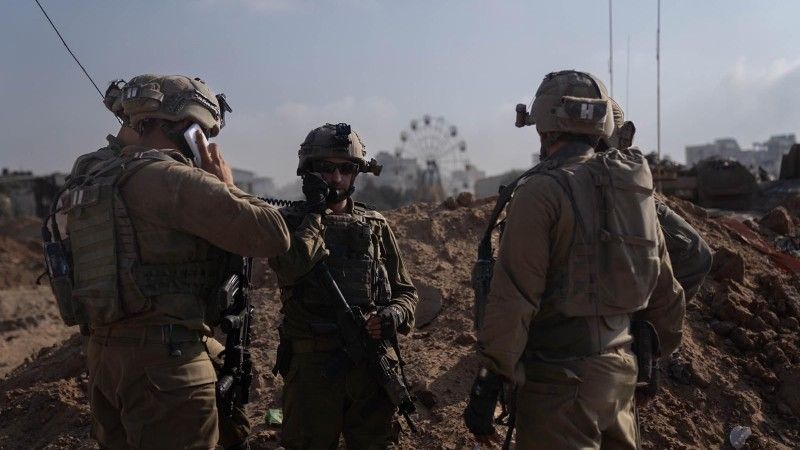- WIADOMOŚCI
- WYWIADY
Middle East will experience one disaster after another [INTERVIEW]
Dr. Robert Czulda discusses contemporary crises in the Middle East, the risk of regional war, and the Palestinian issue with Dr. Abdullah Baabood, a nonresident senior scholar at the Malcolm H. Kerr Carnegie Middle East Center and visiting professor at the Faculty of International Research and Education at Waseda University in Tokyo.

Photo. Israel Defense Forces (@IDF)/X
The past year began quite optimistically and peacefully in the Middle East. Just before the outbreak of the conflict in Gaza, the U.S. security advisor Jake Sullivan argued that the „Middle East is currently calmer than it was two decades ago.” However, we are starting the year 2024 with a very difficult situation. Were Western experts naive and did they misinterpret reality?
It was not only Western observers who were wrong, but also observers from the Middle East. No one expected this to happen. Generally, we tend to look on the positive side of things and sometimes ignore the negative aspects. Recently, here in Muscat, we had a meeting with experts from the Middle East and the Middle East Institute in Washington. Looking at the region, optimism prevailed. Significant importance was attached to the warming of relations between Iran and Saudi Arabia, as well as the Arab normalization of relations with Israel. We discussed various scenarios, and no one anticipated this situation. Of course, there were issues such as Sudan, Lebanon, Iraq, Syria, but it surpassed our imagination.
Part of the problem is that the United States – the most important power in the region – decided to manage conflicts rather than resolve them. If you don’t resolve conflicts, they will come back at some point. Probably the Americans were over-optimistic about the fact that the Arab states have normalized relations with Israel. However, in the end, the core problem, which is the Palestinian-Israeli conflict, has not been resolved after all. Without resolving this, you cannot expect any lasting peace.
Just look around the whole Middle East, and you see that there are either wars, conflicts, failed states, or failing states. Now we have a risk of a widespread conflict between Israel and its neighbors. We talk about de-escalation on one hand, but then we see there’s escalation on the other. So it’s really these contradicting policies.
Many Western experts believe that the situation is currently bad, but it will get even worse. Do you share this pessimistic view?
I believe it will get worse if the conflict in Gaza does not come to an end. Many people, especially in the Middle East but also around the world, witness the atrocities committed by Israel. It is no longer seen as a war of self-defense. People in the Middle East perceive Israeli actions as a deliberate attempt to annihilate the entire area, including schools, and to kill innocent people, including women and children. This sentiment strongly resonates in the minds of people here in the Middle East. They view it as a genocide and ethnic cleansing. Additionally, they observe Western support for Israel rather than calling for a ceasefire, with some supplying more arms to Israel.
I am concerned that this conflict could still escalate, drawing more countries into the crisis. We already see Yemen’s Ansar Allah involved, and Hezbollah active in Lebanon, alongside Iran’s activities, not to mention tensions in Syria and Iraq. There are emerging issues between Iran and Pakistan as well. It could spiral out of control, leading to a regional war. This possibility cannot be underestimated or dismissed.
Are anti-Western sentiments now strong in the Middle East?
Yes, they are much higher than before. Many people are boycotting not only Israeli companies and those American companies that support Israel, but all Western products. German companies are being boycotted too. This is going to lead to another level of tensions that nobody really wants. So, I think the quicker this war is stopped, the better it is for everyone. We need to do some damage control as quickly as possible.
Moreover, the longer it continues, the more radicals will be created. The current situation serves as a catalyst for the radicalization of young people. Extremist groups don’t have to do much; young people are being drawn towards them. I fear that this is going to be really problematic, and I believe it’s going to get worse.
You mentioned that the Palestinian issue is a core problem in the Middle East. Could you please explain why the Arab world considers this as a vital issue? After all, several Arab states recognized Israel and joined the Abraham Accords.
To answer this question, I need to delve into the history of the Israeli-Palestinian issue. People in the Middle East perceive it from the standpoint that Palestine was given to the Jewish people by the colonial powers of that time. After several wars, in which the Arabs were defeated, they eventually realized that they couldn’t overcome Israel militarily. They were prepared for peace and extended offers for reconciliation, with the Oslo Accords and the Arab Peace Plan being some of such examples.
The challenge lies in the fact that Israel seems unwilling to pursue peace. While the global consensus supports a two-state solution, where Israelis coexist with Palestinians, Israel has not shown a commitment to this approach. Instead, they aim to occupy Palestinian lands and establish more settlements. Palestinians live under occupation and face intimidation on a daily basis. Gaza is essentially a large open prison, with restricted travel with no ports, and no airport. Palestinians rely on support from other countries for their basic needs. The West Bank experiences a similar situation.
Furthermore, Israeli politicians adopt an antagonistic approach, exemplified by provocations in the Al-Aqsa mosque in Jerusalem. This is how the situation is perceived by the average person in the region. Arab countries desire peace with Israel, and it can be asserted that all Islamic countries would be open to establishing peaceful relations with Israel.
Well, but I suppose not Iran?
I believe that if the Palestinian issue could be resolved, even Iran would have to change its approach and follow the rest of the Muslim world. Instead, the United States came up with the idea of the Abraham Accords and exerted pressure on certain countries, such as the U.S.-sanctioned Sudan, to accept it. Morocco felt pressured due to the Western Sahara issue. The Gulf countries supported it out of fear of Iran and their reliance on American support. However, the Abraham Accords do not address any underlying problems since these countries are not engaged in any war with Israel.
A genuine peace is needed – only it will bring true calm. But to achieve peace, everyone has to make sacrifices. Israel, however, seems unwilling to make any concessions. Perhaps they have some religious or biblical plan to acquire more land in the near future.
But that’s probably not the only vital issue in the Middle East?
Of course, there are many others, but it still continues to be a main problem, or at least one of the main problems. And it has a lot of different connotations and creates various consequences, like further radicalization of young people. Believe me, the younger Arab generation, in its mainstream, is not driven by ideology, but they are now angered by the Palestinian tragedy.
What is the future of the Abraham Accords?
Countries that signed the Abraham Accords are going to face a lot of pressure. Their plans to deepen relations with Israel will be challenged. Even if the Gaza War stops soon, there will be many questions about Arab cooperation with Israel.
Nevertheless, I think the deal will survive. Let’s start with Sudan. This country is currently suffering from a civil war from two competing factions, and no party will dare to abandon the Abraham Accords as this would tilt the support of the United States against them. Morocco seeks U.S. support regarding the Western Sahara. Many Moroccans are against ties with Israel, but the government has no reason to antagonize the Americans.
Countries in the Gulf also know that their societies are not very happy about the Abraham Accords, but at the same time, they also know that they have enough power to control the situation. Their security apparatuses are very strong.
Can the current anger surrounding the issue of Palestine be another factor that will bring about violent protests in the Middle East? There was talk of the so-called Arab Winter. Is this a realistic scenario?
Yes, I believe that the Arab Spring, Arab Winter, Arab Anger – whatever name you choose – is approaching, and no one can stop it. Just look at Egypt with its collapsing economy. Tunisia is also an example. In some countries, civil wars are ongoing. Most Arab states have dysfunctional governments that cannot meet the expectations of their citizens, especially in terms of the economy.
I think people have learned from the previous Arab Spring, so they don’t want to repeat it. At the same time, regimes have learned how to deal with such protests. But nevertheless, it is just a matter of time before it happens. The new generation of Arabs, young people, suffers from unemployment and doesn’t see too many chances for a decent life. Some of them will seek refuge in Europe or elsewhere, but this is not possible for everyone. So, I am afraid that sooner or later, something is going to happen. It will be really drastic and ugly.
The current war in Gaza also plays a role. The present situation is changing people’s perception of their own government because most Arab governments did not strongly condemn the war. But when you speak to the people, you find them very angry, not only with what’s happening in the war and conflict with Israel and the West, but also with their own government as well.
That was my next question. To what extent is there a gap between Arab leaders and Arab citizens when it comes to the Palestinian issue or other vital issues, such as an approach towards the West?
It is difficult to assess, but there are some indicators nonetheless. Concerning the West, it seems that leaders in the Middle East, specifically in Arab countries, have almost given up on the West. In recent years, various initiatives were undertaken, including dialogues between the European Union and the Gulf Cooperation Council, or between the European Union and the Mediterranean. The United States engaged in talks with the region regarding free trade areas. However, when you examine the real, substantial economic exchange, economic investment, and technology transfer, accomplishments are very limited.
Simultaneously, there is a growing influence of China. Eastern countries are becoming more and more active in the Middle East. The volume of trade has already shifted in favor of the East, and this trend is evident in the energy sector as well. Most Middle Eastern energy is directed towards Asia, mainly China. There are numerous Chinese investments in the region. It’s no surprise that the Middle East is pivoting towards the East. Arab leaders might not openly admit it, but they are undoubtedly making this shift.
Why is this happening?
They are pivoting because they’re looking after their own interests, but also the people are becoming much more eastern-oriented. Look at Russia. I hear people supporting Russia and Putin. This is not because they think what they’re doing in Ukraine is good, but they believe that the United States and the West gave them no option. So, as a result, there is a visible shift both at the level of society and leadership.
So let me finish with two final questions. The first one is about Iran. Last year there were some hopes that this rapprochement between Saudi Arabia and Iran is genuine. How do you see this improvement of relations between Riyadh and Tehran?
I think this is a genuine move, much needed by both countries. Saudi Arabia is now focusing on its Vision 2030 and needs economic growth. Mohammad ibn Salman wants to prove that his vision is going to work. He understands that he can’t achieve this with Iran as an enemy, supporting anti-Saudi proxies. It can be seen that ibn Salman has now been trying to de-escalate tensions in various places, and Yemen is one of them. For this reason, he approached Iran.
The same applies to Iran, which has serious economic problems. Tehran knows that it needs to cooperate with other Gulf states and Arab states. But, of course, there is still a lot of mistrust between these two. This will continue. Nevertheless, I see a strong desire for cooperation. They both see benefits for their economies and security. This is good news, also for other Gulf states.
What is the position of the states in the Persian Gulf on this matter?
They share such an assessment and are optimistic. Oman has always been a country advocating for dialogue and peaceful conflict resolution. We’ve seen the Emirates already doing that. Qatar and Kuwait are on the same page. The only country that perhaps has an issue with Iran is now Bahrain. But Bahrain in the end, it will follow other GCC states. .
Regarding Oman, it is worth adding that negotiations between Iran and Saudi Arabia started here in Muscat. Then they moved to Iraq, and only then were they brokered by China.
What can we expect this year in the Middle East?
At the going rate, we can expect a continuation of previous years and basically one disaster after another. Wherever you look around now on the map, you see fires. Some states are already failed, others are failing. Unresolved conflicts are going to continue. Economic failures will also persist. Almost the only countries that are in relatively good shape are those that produce energy – mainly the Gulf states. But even they are vulnerable to fluctuations in oil prices. Any decrease would increase economic pressure and could lead to instability. So even the Gulf countries cannot be too optimistic about the future.
The situation will be bad unless we learn from the European experience and find our own statesmen such as Adenauer or Schuman that could bring all Arab countries to the table. We can survive only together. We need more cooperation, more coordination, and peaceful coexistence.
I think the West has a role to play. As I mentioned earlier, from the Arab perspective, the West has lost its credibility. The West supports democracy, but then they backed out immediately when the wrong people or their opinion gained power. The West supports human rights, and look at what’s happening in Gaza. The West supports economic development and cooperation, but where are any projects with the Middle East? In just a few years, China has already bypassed the West.
The West still has a chance to rebuild its position and reputation. It has the experience and resources to return to the Middle East and do something more constructive. A more peaceful Middle East means that Europe will also be more peaceful and stable. No one can delink the Middle East from European politics.























